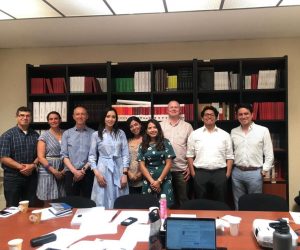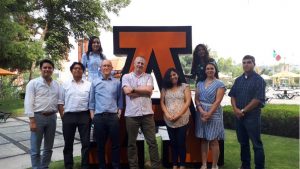Ensuring that that our research considers and promotes equality, diversity and inclusion is central to the work we do at the School for Policy Studies. Working in partnership with communities and stake holders to identify research questions that matter and ensuring that studies are co-produced wherever possible helps achieve these aims. This series of blog posts looks at some of the ways what we research and how we go about it incorporates EDI principles.
In this post, Kate Bowen-Viner (Social Policy PhD student) explores how research in the Centre for Urban and Public Policy Research is making smart city innovation more inclusive.
Introduction
Smart city innovation raises questions about citizens’ inclusion and participation in city governance. The term ‘smart city’ is usually used to describe an urban area that uses digital technology to collect data (e.g. from citizens and the environment) to monitor and manage spaces. Such management may lead to environmental and social benefits in urban areas. For instance, smart city technology can be seen as a way to improve environmental sustainability and citizen’s welfare by optimising cities’ limited resources or monitoring and deterring crime. Whilst these potential benefits appear promising, smart city technology necessitates consideration of equality and inclusion issues related to urban governance, including:
- What role could and should citizens play in developing smart cities?
- What are the opportunities, risks and vulnerabilities for citizens created by increasing reliance on digital technology?
- What does an inclusive approach to smart city development look like?
In this blog, I set out the problem with developing smart cities without citizens’ input and explain how research from the Centre for Urban and Public Policy Research is helping to make smart city innovation more inclusive and equitable.
What’s the problem?
Across the globe, cities are investing in smart infrastructure. The Covid 19 pandemic appears to have accelerated the growth and use of smart city innovations in some places. As the OECD highlighted in July 2020, “the pivotal role of digitalisation in emergency responses to the pandemic has pushed many cities to systematise the use of smart city tools more permanently, while staying alert and monitoring the risk of contagion.” Whilst the rapid growth of digitalisation in some urban areas may provide solutions to some issues, not including citizens in decisions about smart city infrastructure could create long-term problems, including:
1. Urban areas and citizens being ‘locked in’ to using certain types of smart city innovation
Decisions to buy digital infrastructure are likely to have long-lasting consequences. If one type of technology (e.g. from a particular company) is installed in an urban area, this may have impacts on what other forms of smart city technology can be used in the city. It may be expensive or difficult to install another type of technology in the future. Thus, not including citizens in decisions about smart city innovations could mean that citizens are forced to use and fund a type of technology that they do not want, for a long time.
2. Smart city innovation not responding to citizens priorities and interests
If decisions are made about smart urbanism without citizens’ input, innovations may not respond to citizens’ priorities and interests. This could result in some citizens not engaging with smart city innovations and smart city innovations failing to address citizens’ needs.
3. Individuals or groups being disadvantaged or excluded by smart urbanism
There is a risk that some citizens could be disadvantaged or excluded by smart city innovations. For example, if citizens need a certain level of digital literacy to engage with smart city technology, or if they need certain tools like smart phones, this could exclude some individuals or groups from elements of urban life.
Professor Alex Marsh from the Centre for Urban and Public Policy Research is working with Dr Arturo Flores from Anáhuac University, Mexico to lead research that aims to address these issues. In collaboration with Knowle West Media Centre, Professor Marsh and Dr Flores are leading the Empowering Citizen-Orientated Smart City Innovation in Mexico (ECOSCIM) project which aims to develop a new framework to guide smart city innovation to be more inclusive, responsive and reflexive.
The ECOSCIM Project
The ECOSCIM project aims to develop a framework to guide smart city innovation in a way that pays attention to citizens’ needs and priorities. The project involves examining smart city innovations in Mexico City to see how they measure up to the new framework, as well as investigating the social and political contexts in which Smart City innovation takes place.
 To achieve its aims, the ECOSCIM project involves working with citizens, community groups and policy makers in Mexico City to understand different perspectives and to build a new method to help the smart city innovation project. ECOSCIM has a particular focus on Mexico City as the city is large and its smart city innovation has not been researched in great depth. Conducting the research in Mexico City, rather than cities like Singapore or London which have more digital infrastructure, therefore means that the project can shed light on new perspectives about how smart city development can work in different contexts. Whilst the project will help citizens in Mexico City and other parts of Mexico, research findings will also support citizens all over the world who are interested in being involved in smart city innovations.
To achieve its aims, the ECOSCIM project involves working with citizens, community groups and policy makers in Mexico City to understand different perspectives and to build a new method to help the smart city innovation project. ECOSCIM has a particular focus on Mexico City as the city is large and its smart city innovation has not been researched in great depth. Conducting the research in Mexico City, rather than cities like Singapore or London which have more digital infrastructure, therefore means that the project can shed light on new perspectives about how smart city development can work in different contexts. Whilst the project will help citizens in Mexico City and other parts of Mexico, research findings will also support citizens all over the world who are interested in being involved in smart city innovations.

To carry out the project, the research team is collaborating with Knowle West Media Centre and using the Bristol Approach to understand more about Mexico City citizens’ priorities and to involve them in developing smart city innovation. Developed by Knowle West Media Centre, Ideas for Change and Bristol City Council, the Bristol Approach is a way of working that aims to ‘understand the issues people care about’ and how digital technology might help to address problems that citizens experience in everyday life. It involves local groups working together to identify issues that are affecting their cities and gathering information that will help to tackle those issues. The ECOSCIM project is exploring how the Bristol Approach can be used in Mexico City, as well as how Mexico City is involving citizens in smart city development. These inquiries will feed into the creation of a smart city toolkit aimed at communities.
Toolkit for taking action
The key output from the ECOSCIM project will be a toolkit that will help to make smart urbanism more inclusive and equitable. The toolkit will support citizens to get involved in smart city innovation and help them to address issues or problems that people are facing in their cities. Whilst the toolkit will be based on the research project in Mexico City, the research team intends for it to be helpful to communities across the globe.
Citizens’ voices are important
Research from the Centre for Urban and Public Policy Research is helping to highlight the importance of citizen voice and the necessity for an inclusive approach to smart city innovation. In a world where digital and technological infrastructure is quickly becoming more ubiquitous in urban settings, it is vital to remember: citizens can and should be included in decisions about their cities.


